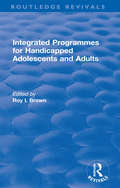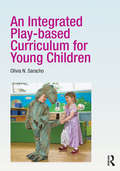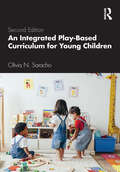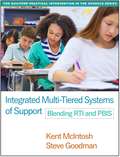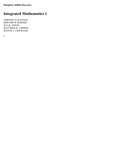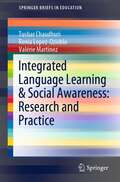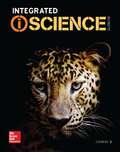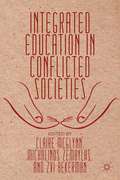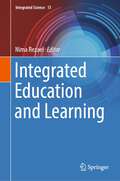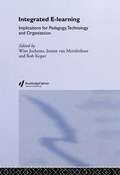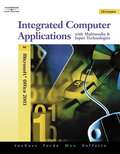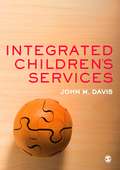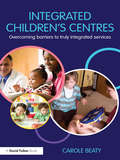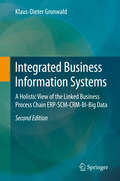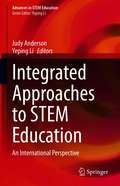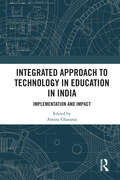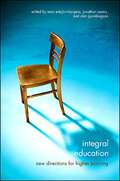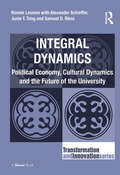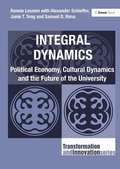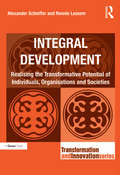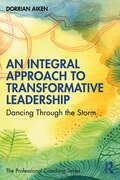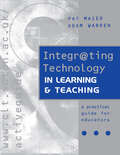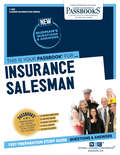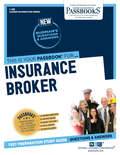- Table View
- List View
Integrated Programmes for Handicapped Adolescents and Adults
by Roy I. BrownFirst published in 1984, Integrated Programmes for Handicapped Adolescents and Adults explores the need to develop integrated programmes for adolescents and adults with developmental disabilities. Whilst the training models and concepts examined largely relate to formal areas of education, such as reading, mathematics, and writing, the book also pays close attention to social education skills, including home management, budgeting, meal preparation, and the development of positive familial relationships. Integrated Programmes for Handicapped Adolescents and Adults presents a number of projects from different parts of the world, with an emphasis on linking research and practice.
An Integrated Play-based Curriculum for Young Children
by Olivia N. SarachoPlay provides young children with the opportunity to express their ideas, symbolize, and test their knowledge of the world. It provides the basis for inquiry in literacy, science, social studies, mathematics, art, music, and movement. Through play, young children become active learners engaged in explorations about themselves, their community, and their personal-social world. An Integrated Play-Based Curriculum for Young Children offers the theoretical framework for understanding the origins of an early childhood play-based curriculum and how young children learn and understand concepts in a social and physical environment. Distinguished author Olivia N. Saracho then explores how play fits into various curriculum areas in order to help teachers develop their early childhood curriculum using developmentally and culturally appropriate practice. Through this integrated approach, young children are able to actively engage in meaningful and functional experiences in their natural context. Special Features Include: Vignettes of children’s conversations and actions in the classroom Suggestions for activities and classroom materials Practical examples and guidelines End-of-chapter summaries to enhance and extend the reader’s understanding of young children By presenting appropriate theoretical practices for designing and implementing a play-based curriculum, An Integrated Play-Based Curriculum for Young Children offers pre-service teachers the foundational knowledge about the field, about the work that practitioners do with young children, and how to best assume a teacher’s role effectively.
An Integrated Play-based Curriculum for Young Children
by Olivia N. SarachoAn Integrated Play-Based Curriculum for Young Children, Second Edition explores how to integrate play across the curriculum, helping teachers develop their early childhood curriculum using developmentally and culturally appropriate practice. Distinguished author Olivia N. Saracho offers a theoretical framework for understanding the origins of an early childhood play-based curriculum and illuminates how young children learn and understand concepts in a social and physical environment. This second edition has been fully updated throughout and its comprehensive coverage has been expanded with entirely new sections on technology and social media, cultural differences in play, and teaching ELLs and students with disabilities. Packed with vignettes, activities, and practical examples, this text is essential reading for pre-service teachers seeking appropriate theoretical practices for designing and implementing a play-based curriculum. Special Features Include: Suggestions and guidelines for activities and choosing classroom materials. Discussion of a full range of curriculum areas and topics including literacy, language, science, social studies, mathematics, art, music, blocks, and movement. Vignettes of children’s conversations and examples of how children learn through play. End-of-chapter summaries to enhance and extend an understanding of young children.
Integrated Multi-Tiered Systems Of Support: Blending Rti And Pbis (The Guilford Practical Intervention In The Schools)
by Kent McIntosh Steve GoodmanMany schools have implemented academic response to intervention (RTI) and schoolwide positive behavioral interventions and supports (PBIS) as separate initiatives. This book provides keys to making these programs more effective, seamless, efficient, and sustainable by combining them into a single multi-tiered system of support (MTSS). Steps and strategies are outlined for integrating data structures, practices, teams, and district systems. Contributing authors present detailed case examples of successful MTSS implementation in three states. In a large-size format with lay-flat binding, the book features 27 reproducible checklists and evaluation tools. Purchasers get access to a companion website where they can download and print the reproducible materials plus other helpful resources. <p><p> This book is in The Guilford Practical Intervention in the Schools Series, edited by T. Chris Riley-Tillman.
Integrated Math 1: Student Edition 2015 (HMH Integrated Math 1)
by Timothy D. Kanold Edward B. Burger Juli K. Dixon Matthew R. Larson Steven J. LeinwandIntegrated Language Learning & Social Awareness: Research and Practice (SpringerBriefs in Education)
by Tushar Chaudhuri Renia Lopez-Ozieblo Valérie MartinezThis book reports on and analyses the Integrated Language Learning & Social Awareness Project, a unique project in the field of Foreign Language Learning and Telecollaboration till now in the world. It takes the existing research on telecollaborative learning, content and language integrated learning and e-learning and combines them into one coherent concept in which language acquisition and enhancement takes place through task-led research on the specific issue of “Healthy Cities” by targeting language learners from around the world. The book delivers insights into the planning and the development of the project including collaborative task design and its underlying theoretical and research frameworks. It then goes on to reflect on how these underlying frameworks are developed further to broaden the existing paradigms of research in the field of telecollaborative language learning.
Integrated iScience: Course 2 (Integrated Science Series)
by McGraw-HillIntegrated iScience print student edition.
Integrated Education In Conflicted Societies
by Claire Mcglynn Michalinos Zembylas Zvi BekermanAcademics and practitioners examine the developing field of integrated education in conflicted societies, where children who would normally be educated apart are deliberately educated together. They draw on a range of theoretical and practical frameworks, providing numerous case studies from Northern Ireland, Israel, Macedonia, and Cyprus.
Integrated Education and Learning (Integrated Science #13)
by Nima RezaeiIntegrated Education and Learning aims to discuss novel approaches to offer integrated educational methods. Within the last few years, educational techniques have evolved to favour critical thinking and improve learning skills. This volume links thinking and learning in educational settings and discusses diverse mechanisms that influence this association; including meta-cognitive capacity, memory, cognitive style, conceptual approaches, digitalization, teaching approaches, echoing, and questioning. It embraces this discussion at all levels, from early childhood education to higher education. This book also includes teaching tips for creating a learning environment that cultivates students’ creativity and critical thinking on both online platforms and live-in-classroom. The book follows discussing the merits of an integrated educational paradigm that will help develop highly intellectual thinkers and will promote modern values to face current and future challenges. Finally, the book shows a balance between learning and education to enhance creativity, critical thinking and social skills.
Integrated E-Learning: Implications for Pedagogy, Technology and Organization (Open and Flexible Learning Series)
by Rob Koper Jeroen Van Merriënboer Wim JochemsIt is widely recognized that online and e-learning is no longer an exclusive approach used only in distance education and in isolation from traditional education programmes. A real difficulty facing educators and trainers is how to integrate these new learning methods and embed them in established and existing forms of learning, teaching or training. This book forms a serious, in-depth study of the subject and proposes that e-learning is not simply a matter of 'digitizing' traditional materials, but involves a new approach, which must take into account pedagogical, technological and organizational features to form a well-designed education system. A practical focus is maintained throughout, with advice on implementation and case studies drawn from the contributors' considerable experience.Integrated E-Learning is essential reading for anyone wanting to implement, design, develop or deliver e-learning or training courses.
Integrated Computer Applications With Multimedia And Input Technologies
by Connie M. Forde Susie VanHuss Donna L. Woo Linda HefferinIntegrated Children's Services
by John M. DavisWorking together with fellow professionals across different sectors of children’s services is central to good practice for all those who work with children and young people. This book looks at how children’s services can work together more effectively; by taking an approach that is grounded in research, the book engages critically with both the benefits and the pitfalls of integrated working. The book encourages the reader to reflect on their own background and how this influences their view of specific children, families and fellow professionals, as well as their own practice. Suitable for all those working with children and young people from Birth to 19 in any aspect of children’s services, this book will ensure professionals work together successfully to the benefit of all.
Integrated Children's Centres: Overcoming Barriers to Truly Integrated Services
by Carole BeatyDesigned to be a one-stop-shop to meet the needs of local communities, Children’s Centres represent a revolutionary shift in the way children’s services are delivered to families. Integrated Children’s Centres looks at the way in which Children’s Centre development has built upon the research and experiences of initiatives such as the HeadStart programme in America and the SureStart programme. Exploring the component elements of truly integrative services and the key players in ensuring positive outcomes: families, the local authority, PCT, private and voluntary sectors, and faith groups, this book covers: the challenges faced by children’s centres how to tackle social issues through the medium of children's centres achieving effective multi-agency working and true collaboration the essentials of leading and managing children’s centres the benefits of early intervention how to effectively deliver health care, education and children’s services. Providing a wealth of case studies, this highly topical book will be of interest to nursery and children’s centres managers and early years practitioners enrolled on the NPQICL or EYPS programmes, as well as students working towards a degree in Early Childhood Studies or MA in Early Years.
Integrated Business Information Systems: A Holistic View of the Linked Business Process Chain ERP-SCM-CRM-BI-Big Data
by Klaus-Dieter GronwaldEnterprise Resource Planning (ERP), Supply Chain Management (SCM), Customer Relationship Management (CRM), Business Intelligence (BI) and Big Data analytics (BDA) are business related tasks and processes, which are supported by standardized software solutions. The book explains that this requires business-oriented thinking and acting from IT specialists and data scientists. It is a good idea to let students experience this directly from the business perspective, for example as executives of a virtual company in a role-playing game. The second edition of the book has been completely revised, restructured and supplemented with actual topics such as blockchains in supply chains and the correlation between Big Data analytics, artificial intelligence and machine learning. The structure of the book is based on the gradual implementation and integration of the respective information systems from the business and management perspectives. Part I contains chapters with detailed descriptions of the topics supplemented by online tests and exercises. Part II introduces role play and the online gaming and simulation environment. Supplementary teaching material, presentations, templates, and video clips are available online in the gaming area. The gaming and business simulation Kdibisglobal.com, newly created for this book, now includes a beer division, a bottled water division, a soft drink division and a manufacturing division for barcode cash register scanner with their specific business processes and supply chains.
Integrated Approaches to STEM Education: An International Perspective (Advances in STEM Education)
by Judy Anderson Yeping LiThis book provides a platform for international scholars to share evidence for effective practices in integrated STEM education and contributes to the theoretical and practical knowledge gained from the diversity of approaches. Many publications on STEM education focus on one or two of the separate STEM disciplines without considering the potential for delivering STEM curriculum as an integrated approach.This publication analyzes the efficacy of an integrated STEM curriculum and instruction, providing evidence to examine and support various integrations. The volume focuses on the problems seen by academics working in the fields of science, technology, engineering and mathematics (STEM) and provides valuable, high quality research outcomes and a set of valued practices which have demonstrated their use and viability to improve the quality of integrated STEM education.
Integrated Approach to Technology in Education in India: Implementation and Impact
by Amina CharaniaThis book explores the evolution of Integrated approach to Technology in Education (ITE), an initiative of Tata Trusts in India, and the many innovative ways in which it has helped enrich the learning process and fostered new skills for young people, especially those living in challenging environments. The book offers an in-depth look into authentic, creative and project-based learning experiences that have been facilitated by using technology in education in different settings in India, with case studies about opportunities and challenges of implementing ITE in the tribal pockets of West Bengal and Maharashtra, madrasas in West Bengal, government schools in rural Assam and sites in Uttar Pradesh. It examines the viability and sustainability of using ITE and other digital methods to address the complex education needs of children and address the challenges in the professional development of teachers. It also highlights the creative use of inquiry, project-based collaborative learning and distance education technologies during the pandemic in government-run schools. This book will be of interest to teachers, students and researchers of education, education technology, ICT and education, digital education and information technology. It will also be useful for educators, policymakers, educational institutions, EdTech start-ups and NGOs in the education sector.
Integral Education: New Directions for Higher Learning (SUNY series in Integral Theory)
by Sean Esbjörn-Hargens Jonathan Reams Olen GunnlaugsonThe educational challenges being faced today are driving us toward a new step in the evolution of educational theory and practice. Educators are called to go beyond simply presenting alternatives, to integrating the best of mainstream and alternative approaches and taking them to the next level. Integral Education accomplishes this by bringing together leading researchers and practitioners from higher education who are actively exploring the frontiers of education from an integral perspective. It presents an overview of the emerging landscape of integral education from a variety of theoretical and applied perspectives. Key characteristics of integral education include: exploring multiple perspectives, employing different pedagogical techniques (e.g., reflective, dialogical, empirical), combining conceptual rigor with embodied experience, drawing on developmental psychology, and cultivating a reflective and transformative space for students and teachers alike. Integral Education provides the most comprehensive synopsis of this exciting new approach and serves as a valuable resource for any integral effort within education.
Integral Dynamics: Political Economy, Cultural Dynamics and the Future of the University (Transformation and Innovation)
by Ronnie Lessem Alexander Schieffer Samuel D. RimaThe theory of integral dynamics is based on the view that the development of individual leaders or entrepreneurs requires the simultaneous development of institutions and societies. It seeks a specific way forward for each society, fundamentally different from, but drawing on, its past. Nearly every natural science has been transformed from an analytically-based approach to a dynamic one: now it is time for society and culture to follow suit locally and globally. Each culture, discipline and person is incomplete and is in need of others in order to develop and evolve. This book sets out a curriculum for a new integral, trans-cultural and trans-disciplinary area of study, inclusive of, but extending beyond, economics and enterprise. It embraces a trans-personal perspective, linking self with community, enterprise and society, and focusing on the vital relationship between local identity and global integrity. For the government policy maker, the enlightened business practitioner, and the student and researcher into economics and enterprise, the new discipline is set out here in complete detail by a multi-national team of Gower's Transformation and Innovation Series authors. Illuminated with examples relating the conceptual to the practical, this is a text, not for a pre-modern, modern, or even post-modern era, but for what has been called our trans-modern age.
Integral Dynamics: Political Economy, Cultural Dynamics and the Future of the University
by Ronnie Lessem Alexander Schieffer Junie T. Tong Samuel D. RimaThe theory of integral dynamics is based on the view that the development of individual leaders or entrepreneurs requires the simultaneous development of institutions and societies. It seeks a specific way forward for each society, fundamentally different from, but drawing on, its past. Nearly every natural science has been transformed from an analytically-based approach to a dynamic one: now it is time for society and culture to follow suit locally and globally. Each culture, discipline and person is incomplete and is in need of others in order to develop and evolve.
Integral Development: Realising the Transformative Potential of Individuals, Organisations and Societies (Transformation and Innovation)
by Alexander Schieffer Ronnie LessemAlexander Schieffer and Ronnie Lessem introduce a groundbreaking development framework and process to address the most burning issues that humanity faces. While conventional top-down, outside-in development has reached a cul-de-sac, a new, integral form of development is emerging around the world. Integral Development uniquely articulates this emergent approach, and invites us to fully participate in this process. The integral approach has been researched and framed over decades of in-depth experience in transformative development education and practice all over the world. It uniquely combines four mutually reinforcing perspectives: nature and community; culture and spirituality; science, systems and technology; and enterprise and economics. Conventional development theory and practice has prioritized the latter two perspectives, neglecting the former two. This has caused massive imbalances in today’s world. The four interconnected perspectives allow for a transformative and integrated engagement with core development issues in a way that is locally relevant and globally resonant. Throughout, the practical impact of Integral Development is brought to life through highly innovative cases from around the globe, drawing on the authors` first-hand experience. This makes the book a living demonstration of the power of this pioneering approach. Integral Development shows how individual, organizational and societal developments need to be interconnected to release a society’s full potential. It shifts the responsibility for large-scale development from often-distant experts and organizations to each individual, community, enterprise and institution within the society. It is essential reading - and a call to action - for everyone concerned with the current state of local and global development.
An Integral Approach to Transformative Leadership: Dancing Through the Storm
by Dorrian AikenThis essential new book is a practical "how-to" guide to enhancing the quality of relationships between leaders and individuals in organisations – the proven key to maximising performance, building resilience, and retaining talent. Integral vision, seen through each of the four quadrants described in this book, gives access to a range of perspectives, irreducible to one another but each significant in adding a kaleidoscope of understanding to a topic or body of knowledge. The author draws on recent research which focuses on Integral theory and emphasises the benefits to an organisation, including cultivating, at several levels, leaders and teams through coaching, improving the quality of meetings, introducing an understanding of emotional intelligence, and more recently, addressing adult stages of development. The book also demonstrates how the Integral quadrants can bring clarity to interpersonal and cross-sector communication, especially in diagnosing, planning, and implementing team and organisational strategy. The concepts and practical skills explored in this book will be a valuable resource for senior leaders, human resources specialists, and in-house and external coaches focusing on leadership development, as well as students and trainers of coaching.
Integr@ting Technology in Learning and Teaching: A Practical Guide For Educators
by Maier, Pat Warren, Adam (both of the Interactive Learning Centre, Southampton University)This volume looks at the issues involved in integrating new technologies within the education process. It includes activities, case studies and notes for use by all teaching in higher education.
Insurance Salesman: Passbooks Study Guide (Career Examination Series)
by National Learning CorporationThe Insurance Salesman Passbook® prepares you for your test by allowing you to take practice exams in the subjects you need to study. It provides hundreds of questions and answers in the areas that will likely be covered on your upcoming exam, including but not limited to: insurance principles and practices; Business Law; and more.
Insurance Planning
by James F. Dalton Michael A. Dalton Thomas P. Langdon Joseph M. GilliceThis book is written for undergraduate and graduate level students interested in acquiring an understanding of financial planning from a professional financial planning viewpoint. The text is intended to be used in an overall curriculum in financial planning in an Insurance course or in a course that combines Fundamentals of Financial Planning and Insurance.
Insurance Broker: Passbooks Study Guide (Career Examination Series #C-388)
by National Learning CorporationThe Insurance Broker Passbook® prepares you for your test by allowing you to take practice exams in the subjects you need to study. It provides hundreds of questions and answers in the areas that will likely be covered on your upcoming exam.
